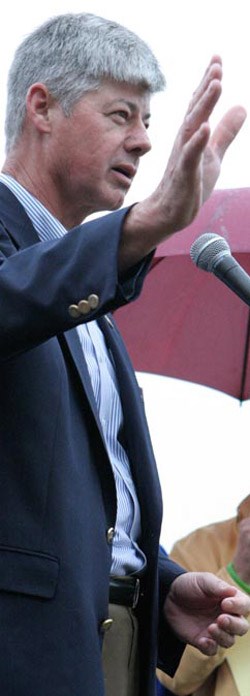NEWS RELEASE
CONGRESSMAN BART STUPAK 1ST CONGRESSIONAL DISTRICT OF MICHIGAN
************************* Stupak proposes legislation to improve collaboration at FCC
WASHINGTON, DC - U.S. Congressman Bart Stupak (D-Menominee) introduced legislation that would allow members of the Federal Communications Commission (FCC) to work collaboratively to address complex telecommunications issues.
H.R. 4167, the Federal Communications Commission Collaboration Act, amends the Government in the Sunshine Act to allow more than two FCC commissioners to meet privately to discuss FCC business as long as a commissioner of each political party is present and the content of the meeting is publicly disclosed.
“As the FCC commissioners weigh the complex and contentious issues, it is vital they are able to hold frank conversations, receive the best information possible, and have the opportunity to benefit from one another’s expertise and experience,” Stupak said. “This bill strikes a balance between the need for transparency and the need for increased collaboration among the FCC commissioners.”
H.R. 4167 would authorize the FCC to hold limited, non-public, collaborative discussions when more than two commissioners are present.
To ensure continued transparency the bill would require a public summary of the issues discussed and a list of the meetings participants be published within five days.
The proposed legislation would also prohibit official actions, such as voting, from being taken privately and would limit discussions to FCC commissioners and their staff.
Currently, the Sunshine Act requires meetings by federal agencies be open to public observation when there is a quorum present.
Because the FCC consists of just five commissioners, three commissioners constitutes a quorum.
As a result, FCC commissioners must rely on written communication, staff, or one-on-one meetings to discuss issues before the FCC.
H.R. 4167 would expire after five years to allow Congress an opportunity to review its implementation and decide whether the public interest has benefited from the legislation.
As chairman of the House Energy and Commerce Committee’s subcommittee on oversight and investigation, Stupak launched an investigation in 2008 into the FCC’s regulatory processes and management practices.
Following a bipartisan investigation by the House Energy and Commerce Committee, Stupak and Congressman John Dingell (D-MI), then chairman of the Energy and Commerce Committee, released a report entitled, Deception and Distrust, identifying issues of concern and providing a roadmap to improve transparency and effectiveness at the FCC.
Stupak is also a member of the subcommittee on communications, technology, and the Internet, which held an FCC oversight hearing in September.
At that hearing Stupak reminded FCC commissioners it was their duty to ensure regulatory decisions are made in a transparent and timely manner based on the facts.
*************************
